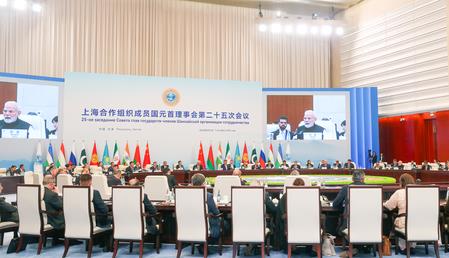SCO Nations Back Open, Fair, Multilateral Trading System Amid US Tariff Turmoil
The SCO summit, attended by Prime Minister Narendra Modi, Chinese President Xi Jinping and Russian President Vladimir Putin, adopted a statement on support for the multilateral trading system.
“Member States oppose unilateral coercive measures, including those of an economic nature, that contravene the UN Charter and other norms of international law, the rules and principles of the World Trade Organisation, damaging the interests of international security, including its food and energy components, negatively affecting the global economy, undermining fair competition, hindering international cooperation and the achievement of the UN Sustainable Development Goals,” the joint declaration states.
The statement comes in the backdrop of the tariff turmoil triggered by US President Donald Trump, which has led to heightened economic uncertainty in global markets.
SCO member states favoured further deepening people-centred cooperation on issues related to improving the well-being and living standards of the population in the SCO area. They will continue to implement the Programme of Multilateral Trade and Economic Cooperation, as well as the SCO Economic Development Strategy for the period up to 2030 and the Action Plan for its implementation by the interested parties, the joint statement said.
It was decided that member States will, in accordance with their national legislation, develop cooperation on a voluntary basis through special economic zones, including the use by interested States of the potential of the China-SCO Regional Trade and Economic Cooperation Demonstration Zone in Qingdao.
The SCO members aim to promote cooperation in the field of e-commerce, develop digital trade infrastructure, and bridge the gap between developed and developing countries in the digital economy. They noted the proposal to develop a Programme of Cooperation among SCO member states in the field of e-commerce. A statement was adopted on strengthening cooperation in the digital economy.
The member states also noted the proposal to establish an SCO mechanism for export credit and investment.
The member states emphasised that support for innovation and creative industries contributes to increasing the competitiveness of economies, developing small and medium-sized businesses, and expanding the employment market in SCO member states, especially in remote and rural areas.
In this context, they advocated intensifying the work of the SCO Technoparks and Innovation Clusters Pool, and noted proposals to develop the SCO Future Technologies Programme and utilise the potential of the Alem. AI international centre for innovation implementation.
They noted the adoption of the statement by the heads of authorised ministries and departments of SCO member states on strengthening investment cooperation in the field of sustainable development, as well as the proposal to adopt a set of measures to stimulate mutual investment in SCO member states.
The SCO nations also supported the reform of the international financial architecture aimed at increasing the representation and role of developing countries in the governing bodies of international financial institutions, including the International Bank for Reconstruction and Development and the International Monetary Fund.
The Member States emphasised the important role of cooperation in the financial sphere in promoting economic growth in the SCO area. They stressed the importance of further implementation by interested SCO member states of the roadmap for the gradual increase of the share of national currencies in mutual settlements.
Reaffirming the importance of establishing an SCO Development Bank, the interested member states decided to establish it and intensify consultations on a range of issues related to the functioning of this financial institution.
A statement by the Council of Heads of SCO Member States on cooperation in the field of green industry was also adopted.
The member states support the expansion of inclusive and mutually beneficial cooperation in the field of energy, the steady improvement of the sustainability of energy production and supply chains, and are ready to promote the sustainable, stable and balanced development of a non-discriminatory global energy market, the statement added.

Legal Disclaimer:
MENAFN provides the
information “as is” without warranty of any kind. We do not accept
any responsibility or liability for the accuracy, content, images,
videos, licenses, completeness, legality, or reliability of the information
contained in this article. If you have any complaints or copyright
issues related to this article, kindly contact the provider above.
Most popular stories
Market Research

- UK Cosmetics And Personal Care Market To Reach USD 23.2 Billion By 2033
- Global Mobile Wallet Market Size Projected To Reach USD 701.0 Billion By 2033 CAGR Of 15.09%.
- $MBG Token Supply Reduced By 4.86M In First Buyback And Burn By Multibank Group
- From Zero To Crypto Hero In 25 Minutes: Changelly Introduces A Free Gamified Crash Course
- Japan Halal Food Market Size To Surpass USD 323.6 Billion By 2033 With A CAGR Of 8.1%
- Pluscapital Advisor Empowers Traders To Master Global Markets Around The Clock


















Comments
No comment